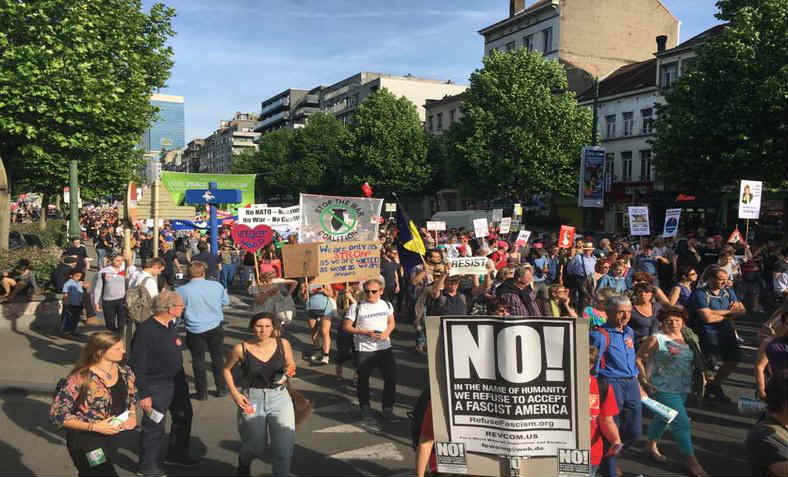 Anti-NATO protesters. Photo: Chris Nineham
Anti-NATO protesters. Photo: Chris Nineham
It’s been a significant week in the murky history of Nato, writes Shabbir Lakha
On Wednesday 24th May, tens of thousands of people marched in Brussels against Trump ahead of his arrival for the Nato Summit. Activists from around Europe, including from the UK, gathered in the centre of Brussels to make it clear that Trump was not welcome. Speakers at the start of the demo, where protesters were assembling, included water protectors from Standing Rock and people from various European organisations, including Maz Saleem from Stop the War Coalition.
The march was spirited, full of energy and determined to let Trump know that his hateful, divisive and reactionary rhetoric had no resonance here.
The Nato Summit
The headlines coming out of the Nato Summit focused on Trump shoving the Prime Minister of Montenegro, but the actual deliberations of the summit haven’t received much attention. Three key things that were discussed at the Summit
1Trump urged Nato members to increase the amount they spend on military and defence. In 2006 a guideline was set for Nato members to spend 2% of their GDP on their military. The US, at the top of the list, spends 3.61% of its GDP (roughly $670bn) and 4 other countries – Greece, Britain, Estonia and Poland meet the 2% target. The costs of maintaining and upgrading nuclear weapons and of wars and drone programmes are not necessarily included in this. The target is non-binding, but it was agreed this week that an annual review would be set up and countries contributing the least would be pressured to increase their military spending.
2Nato has agreed to officially join the US-led coalition against IS. The current 28 member states are all individually already involved and contributing to the coalition but Nato as an organisation will now officially have a say in the strategic aims of the coalition and participate in training, advising and combat missions.
3There has been a drive to increase troop numbers in Afghanistan after the huge increase in Nato casualties in the last year. The head of Nato was in London earlier this month to ask Theresa May to commit more troops. At the Summit, it was agreed that Nato would sustain the military campaign in Afghanistan until at least 2020, but a decision on increasing troops for 2018 wasn’t reached. Trump said it will be finalised later this year, however several member states had already expressed willingness to contribute extra troops.
These three issues are incredibly significant and need to be discussed. Jeremy Corbyn was grilled on Friday for his comments critical of Nato prior to becoming Labour Leader. But this is the reality of what Nato is and people need to understand it.
At a time when we are told that we need to “live within our means” and there isn’t enough money for the NHS, for disabled people or elderly people, there is apparently always enough to commit to the military – and more if Trump asks for it. The same applies across Europe where austerity has been rampant, particularly in Greece, one of the 5 countries currently meeting the target.
The war in Afghanistan has now lasted 16 years and they plan to sustain it for another 3 years at least and increase their presence there. Isn’t it about time we accepted that this failed war has brought nothing but misery and suffering to the people of Afghanistan, instability to the region and increased terrorism in Afghanistan and Pakistan as well as in the West?
On Thursday night a series of airstrikes by the Coalition against IS killed 106 civilians – 42 of them children – in Deir Az Zor in Syria, and the Pentagon recently accepted responsibility for the killing of 105 civilians in Mosul during an air-raid in March. This is what Nato has agreed to join and expand.
No to Nato conference
Not far from the Summit, anti-war activists from around Europe met for a counter-conference. In a series of panels and workshops, people representing many different organisations discussed how we can strengthen the antiwar movement across Europe, reclaim the narrative around Nato and mobilise against it.
Reporting on the situation in Britain, Chris Nineham told the conference
“It is now conceivable that the winner in a general election in Britain could be someone who is publicly known to be opposed to imperialism, opposed to Britain’s colonial role, opposed to wars and opposed to these obscene and stratospheric levels of military spending.
That should give us hope that it is actually possible to win these kind of arguments and to create a really genuine mass popular reassessment of the kind of disastrous foreign policies that have been pursued over the last 16-17 years.
Trump booed
On his way to the Nato Summit, Trump was confronted by British protesters booing him and shouting “Stop Trump”. As his 20 car convoy drove past, the protesters who were stuck at a road block and surrounded by Belgian police and soldiers shouted him down. True to his deluded self, Trump carried on waving.

